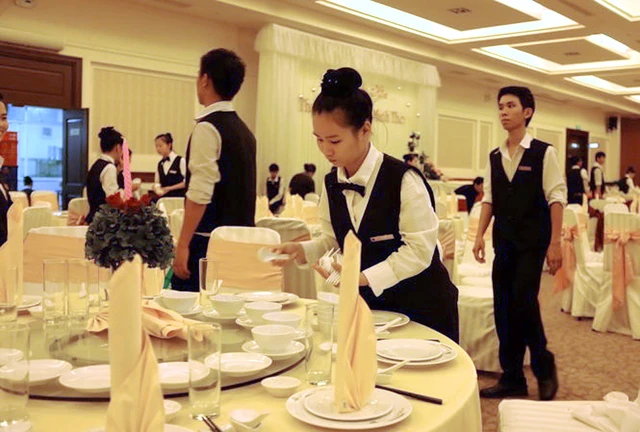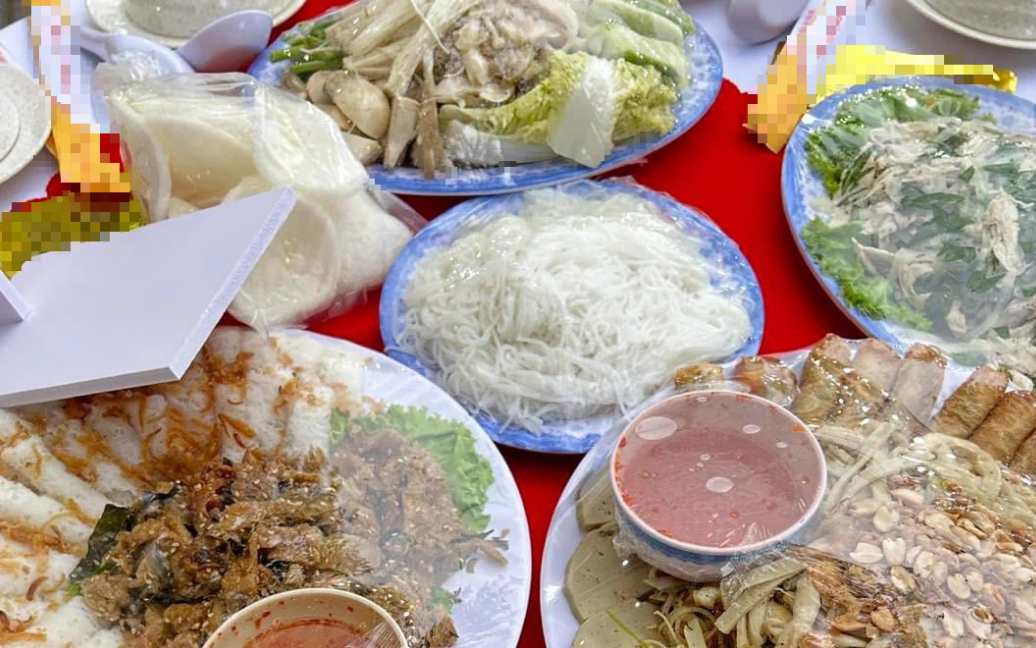
Staff members set up dining tables to welcome guests a wedding venue in Ho Chi Minh City. Photo: Hoai Linh
Vietnamese culture places the wedding ceremony as a foundational tradition. Within this fundamental Vietnamese practice, people have questioned if it is acceptable to take unused food home from the event?
This question seems to divide the community over the etiquette and moral position of removing leftover food from weddings.
Last year, while attending a wedding in the former Go Vap District of Ho Chi Minh City, I had an experience where our teachers’ table—a half-full table of foreign teachers—was approached by a lady while we were still eating. Because some of the food served before the hotpot (typically the last main dish of wedding meals in Vietnam) had not been touched, due to empty seats, she believed it was acceptable to take it—even though we were still eating.
With this in mind as an extreme example, when we explore the moral dilemma of 'is taking food home from a wedding okay?' we must consider a few variables. First, there’s a clear difference between city weddings and country weddings, each with distinct traditions and timings. Then comes the question of who takes the food and when. These factors are so variable that a one-size-fits-all statement isn’t practical.
In a recent article, many people discussed how uncouth and improper it was to take food home from a wedding. And at times, that viewpoint might be justified but we need to dig deeper because it is more than just taking food without permission.
From an environmental position, we should ask the reverse question: “Is it right to throw away good, edible food?” Food waste is a significant health issue and economic burden. It pollutes the environment and is wrong when so many people in our community, especially in Ho Chi Minh City, go hungry every day.
If you answered this question the same way I did, then the idea of taking food home from weddings begins to take on a new light. When shared with others, this act can help improve both the environment and economy.
So, the conversation shifts to who can take the food and when it should be taken. These are critical questions and are the highlight of my personal experience in Go Vap last year. If the food is taken with the host’s and catering company’s support, then the process becomes entirely acceptable.
Why does society consider this action inappropriate?
For over a century, Western culture carried the stigma that taking leftover food was something only the poorest people would do, not the well-off people. This idea reigned over a culture and became the norm, but it was very wrong and has cost us significantly in environmental damage.
If we strip away the elitist view and approach this from a logical, environmental point of view then we should all agree there’s nothing shameful or wrong about this practice, as long as it has the support of the organisers.
It’s clear that country weddings in Vietnam often have a deeper sense of community. Sharing leftover food afterward is more common and culturally accepted. The host, most usually the mother, will insist that people take home food, and sometimes beers, in order to share the unused consumables with her community.
This idea leads to an actionable solution: hosts and catering companies could support the process of food-sharing. A practical step might be placing containers on tables, allowing guests to take home food as they wish. If food were made equally available to everyone, there’d be no reason for judgment.
Recreating this issue from one of etiquette to an environmental impact offers far greater logic. We could even go a step further and collect the used leftover food for pets and animals. Ideally, with proper management, a wedding should generate zero food waste.
In my view, we need to stop recycling Western beliefs from the 1800s and instead regard food as a precious, finite resource. We should transform food preservation into a celebrated community value and not a process that is a necessity for the poor.
Vietnam has progressed immensely over the past 50 years. Back at the end of the war, every edible item was treasured because food was scarce. Nothing was wasted and that principle remains deeply respected in Vietnamese culture today.
This issue isn’t about the wedding’s cost, the size of the gift, or whether guests are wealthy or poor. It’s not about greed or guests wanting a return for attending. It’s about being responsible and logical, and not wasting food.
When we look at this question, let’s not forget the hard times that shaped Vietnamese culture. Our younger generations need to understand and preserve the values of Vietnamese communities. This country was built on the philosophy of wasting nothing and that’s why I view taking food home from weddings as a logical, supportive act that needs to be respected and appreciated in every society around the world.
We are in a new world with limited housing, limited energy and limited resources. Food at weddings is just one small area where changes to thinking are a must to improve the planet for our children and grandchildren.



Max: 1500 characters
There are no comments yet. Be the first to comment.